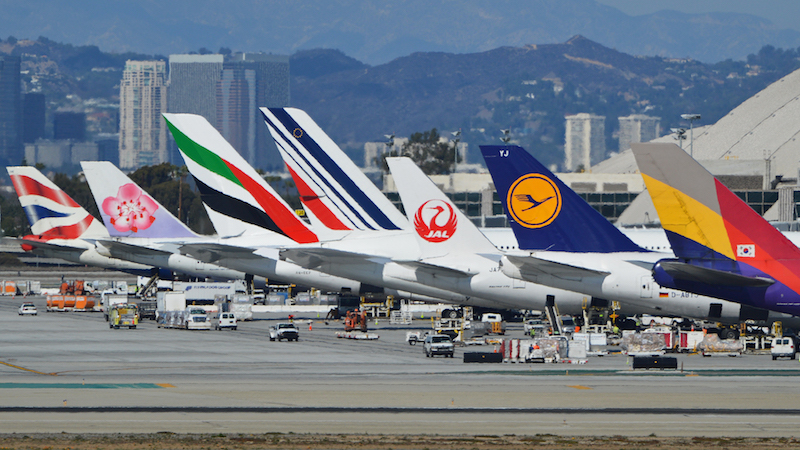The International Civil Aviation Organisation (Icao), a United Nations agency, decided on Friday to press ahead with plans to make its emissions offsetting scheme the only option available to its 193 member states, teeing up a dilemma regarding the EU’s own system.
EU delegates have been criticised for failing to raise meaningful objections to Corsia, an instrument designed to force airlines to limit their environmental impact but which could torpedo Europe’s own emissions trading scheme (ETS).
The ETS currently includes all flights that operate within the European Economic Area but precludes trips in and out of the catchment area. A new Icao resolution now says that Corsia “should be the only market-based measure applied to international flights”.
Icao wants to avoid duplicative counting of emissions but EU countries were asked by both the European Commission and Parliament ahead of the meeting to lodge a formal “reservation” when appropriate. Only verbal objections were made by transport officials.
A commission spokesperson reiterated after the assembly had finished that the EU is committed to Corsia’s implementation but that it should co-exist with the bloc’s own policies and efforts to meet the terms of the Paris Agreement.
The EU executive later insisted that “no state at Icao put this into question, nor did any question the EU ETS. Therefore there was no need to file a formal reservation.”
A spokesperson added that “Finland on behalf of the EU reiterated its full support to Corsia but also stated that we retain under the Chicago Convention our existing legal framework and policy space, and our ability to go beyond Icao rules in light of the EU’s Paris Agreement commitments.”
The commission also insisted that the Icao resolution applies to global instruments not regional systems like the ETS.
Dutch Green MEP Bas Eickhout told Euractiv that “again, the EU doesn’t dare to draw the line at Icao”, adding that the UN body is “not up to the [climate] task so the EU should continue with its regional approach”.
Corsia and the ETS differ in that the UN scheme requires airlines to make payments to offsetting schemes around the world, like forestry projects, while the ETS is a market-based mechanism tied to a carbon price that can go up and down.
Clean mobility group Transport & Environment released new analysis in September that suggests aviation emissions would increase by 683 million tonnes of CO2 over the next decade if the EU relies solely on Corsia.
This is a reminder that CHN is a small independent news site, dedicated to bringing you news from all over the world. That’s expensive and we need our readers to help. Here’s how you can, even for a few dollars a month.
That figure is equivalent to the annual emissions of France and Poland combined.
“The UN offsetting scheme will allow airlines to go on growing their emissions while paying others for cheap offsets. In a world where every sector needs to reach zero emissions, the sums don’t add up,” said T&E expert Andrew Murphy.
However, the head of the International Air Transport Association (IATA), Alexandre de Juniac, said that “we need to implement Corsia successfully. It’s essential to our promise of carbon-neutral growth.” IATA insists that offsetting could stimulate more than $40 billion in climate financing.
In 2021, Corsia begins its voluntary phase, which all EU countries have agreed to join. India and Russia are notable absentees, while China has also soured on the idea. In 2016, 65 countries signed up for the demo and now the number has grown to 81.
The scheme is meant to be fully operational by 2027 and include all Icao members. A review of the EU ETS is scheduled for 2024, when officials could decide to let the scheme revert to including all flights in, out and within the bloc.
Incoming commission chief Ursula von der Leyen has tasked her transport commissioner with tweaking the ETS before that point though, by extending it to shipping and cutting free emission permits for airlines.
Icao member states also failed to adopt an aviation-specific emissions target for 2050 but did agree to look into what options are available. The results will be presented at the body’s next general assembly in 2022.
The Air Transport Action Group, which represents airlines and other industries, said it was “encouraged that there was clear support from governments meeting at Icao to develop a UN-backed goal”.
Estonia backs European net zero carbon target. Poland loses an ally
However, Iata vice-president Paul Steele told the Icao assembly that the meeting had been “unprecedented” and “a step backwards”. He added that “sadly, I think we are going to have to move faster than Icao is going to be able to move” on environmental matters.
International aviation and shipping have long been excluded from climate agreements but the UN bodies that have oversight, Icao and the International Maritime Organisation (IMO), have faced pressure to set targets.
The IMO aims to cut emissions from its sector by 50% compared with 2008 levels by 2050 but critics already warn that no viable plan to do so has been drafted.
Aviation is responsible for roughly 2.5% of global carbon emissions, while shipping accounts for 2.2%. Both would feature in the top ten emitters if classed as countries.
This article was updated with comments from the European Commission. This story was originally published by CHN’s media partner Euractiv.
